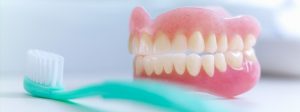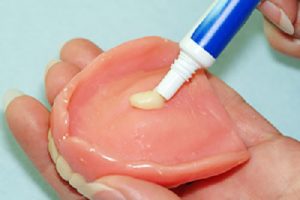The post How to Clean Your Dentures appeared first on All Denture Services.
]]>
How to Clean Your Dentures During the Day
When you are wearing your dentures throughout the day you are likely going to be using your dentures to eat. Like natural teeth it is important to maintain a regular cleaning schedule after meals to ensure that any built up foodstuffs are removed from your dentures. However, the use of regular toothpastes and stiff bristled brushes is strongly advised against. After a meal, it is recommended to remove the dentures and run them under cool water to remove any pieces of food that have built up. Further to this you should brush your dentures with a specialised denture cleaning paste, using a soft bristled brush. Once you have brushed your dentures, run them under cool water again to remove any paste residue. As a handy tip some patients like to place a face washer or hand towel in the sink to reduce the chance of denture breakage, should you drop them.
How to Clean Your Dentures at Night
 The other important time to ensure you are cleaning your dentures properly is while your sleep. Night time is a great time to clean dentures and is one of the easiest cleaning tasks to do. Assuming you have brushed your dentures after your most recent meal, you can prepare your dentures for a night time clean. Generally, dentures are added to water, with an added denture cleaning solution. This solution does two very important things – firstly it cleans your dentures to remove any plaque and/or bacteria that may have built up. Secondly, it ensures your dentures do not dry out. It is vitally important not to leave your dentures outside of your mouth or submersed in a water solution as dentures can dry out, and as a result become damaged. It is important to ensure you never put your dentures in boiling water – this can warp the dentures structure and cause them to be permanently damaged.
The other important time to ensure you are cleaning your dentures properly is while your sleep. Night time is a great time to clean dentures and is one of the easiest cleaning tasks to do. Assuming you have brushed your dentures after your most recent meal, you can prepare your dentures for a night time clean. Generally, dentures are added to water, with an added denture cleaning solution. This solution does two very important things – firstly it cleans your dentures to remove any plaque and/or bacteria that may have built up. Secondly, it ensures your dentures do not dry out. It is vitally important not to leave your dentures outside of your mouth or submersed in a water solution as dentures can dry out, and as a result become damaged. It is important to ensure you never put your dentures in boiling water – this can warp the dentures structure and cause them to be permanently damaged.
Consistency is the Key
As you can see above, the answer to how to clean dentures really is not so much a matter of how, rather how often – regularly. Denture cleaning isn’t and shouldn’t be a complex task, rather it is important to focus on a regular schedule of cleaning to maintain your dentures.
Professional Denture Cleaning
All Denture Services Denture Clinic Brisbane recommend regular professional cleaning for a more thorough clean. A professional clean & polish will remove stains and tartar build up giving your dentures a new appearance. We also offer advice to our patients on the best way to clean their dentures, such as the best denture night time cleaning solution and appropriate denture paste. We can also help repair your dentures if they have become uncomfortable due to poor maintenance.
Our primary goal is your satisfaction. We will restore the self confidence that comes with a beautiful smile.
Enquire about our special rates for Pensioners
Call us today for a Free Consultation
Phone: (07) 3274 3936
The post How to Clean Your Dentures appeared first on All Denture Services.
]]>

 This is somewhat misleading – not because one term refers to a number or row of teeth- rather either term could be used to refer to either number of teeth – singular or plural. As a case in point you certainly can have
This is somewhat misleading – not because one term refers to a number or row of teeth- rather either term could be used to refer to either number of teeth – singular or plural. As a case in point you certainly can have  Denture Care at Night
Denture Care at Night